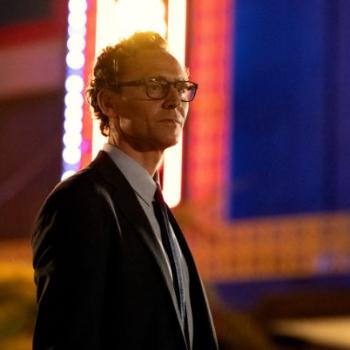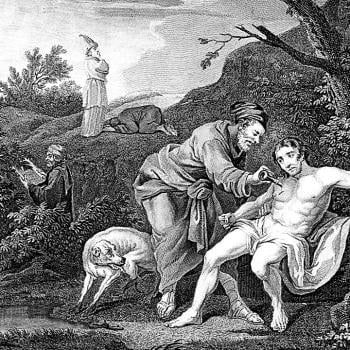This was the decade of “new lads” in Britain. Rejecting the sensitive New Age male archetype, “new lads” embraced macho pastimes such as public displays of drunkenness, soft porn stag parties, and soccer fanaticism. Sophie Manham, who had been commissioned to make a segment about this new species for Channel 4, wanted to alternate the talking heads with short segments of an actor portraying a “new lad” in all his beer-drinking lasciviousness to lighten up the program. One of her researchers, William Sutcliffe, mentioned his school friend, Sacha.
“He could steal the show even then,” says Manham. “You could see Borat and Bruno already. He had a twinkle in the eye.” Sacha was “fearless,” according to Manham, coming up with portrayals of disgusting behavior such as attempting to light his fart with a cigarette lighter. In some clips, he tenderly strokes a soccer ball and leers over plastic molded breasts. Much like his Borat persona, he manages to both embody his character and condemn it, with a figurative wink to the audience. His performance helped him land a gig on London Weekend Television, where he developed the precursor to Ali G, a takeoff on the BBC radio hip-hop DJ Tim Westwood, who had become famous in Britain for his “wigger” -- “white nigger” -- style with a Jamaican accent and outrageous clothing.
Sacha would spend years “wallowing in cable TV hell,” in the words of one 2002 biographical documentary. “I gave myself five years to start earning money from being an actor, a comedian . . . If it didn’t work out, I was going to move on to something else, become a barrister or something,” he said in a 2006 Rolling Stone article. With only two months left in his five-year plan, the big break came. “I was sitting on a beach in Thailand. It was four years and ten months since I’d graduated,” Sacha recalled. “And that’s when I got a call from my agent saying there’s this audition for “The 11 O’Clock Show” . . . I had been rejected so many times that I didn’t know if it was worth it.”
“The 11 O’Clock Show,” a thrice-weekly late night satirical program on Channel 4, premiered in 1998 and became enormously popular for its brand of “hoax journalism.” The targets were celebrities who usually had no idea they were submitting themselves to mock interviews by comedians posing as journalists. It was here that Sacha honed his character Ali G, who became so recognizable that the Queen Mother did an imitation of him. He also developed early versions of Bruno and Borat.
A year after the show’s debut, the Evening Standard described Sacha as “more remote than the Queen Mother and twice as famous.” Reportedly one reason he brought Ali G, Bruno, and Borat to the United States was that he had become so recognizable in Britain he could no longer pull off his hoax journalism. When Sacha’s own Da Ali G Show, co-authored and produced by Dan Mazer, premiered in Britain in 2000, it was an instant success. Ali G Indahouse, Sacha’s first major foray into film, was the highest grossing British film of 2002, despite reviews ranging from tepid to savage.
But when HBO launched the American version of the show in 2003, it got off to a slow start with less than a million viewers and mixed reviews, some damning it as tasteless. Many Americans didn’t get the nuances of his humor; others may have been offended by his reference to 9/11 as “the terrible events of 7/11.” Sacha “very cleverly picks on some of the cruder British stereotypes of America and makes them worse,” observes Peter Mandler, professor of modern cultural history at Cambridge. Also invisible to most American eyes is Sacha’s incorporation of edgy Israeli touches. When Sacha visited his brother Amnon, who was living in Israel in 2002, the Israeli daily Ha’aretz noted, “Baron Cohen’s Hebrew is excellent and he has a good understanding of Israeli culture.” This is evident in the film Borat: Sacha uses his fluent Hebrew, peppered with Israeli slang and occasional Polish, to pass for Kazakh.
There is little reason for Americans to recognize just how unusual Sacha is among British Jews. The Jewish communities in the United States and the United Kingdom differ in significant ways. British Jews tend to be more observant than their American counterparts, in part because the community is smaller and concentrated in upper middle class “Jewish ghettos” and because the British chief rabbi is Orthodox. The influence of Jews on British popular culture is also much less pronounced. Vivian Baron Cohen says he’s “always amazed” that in the United States at Rosh Hashanah and Yom Kippur “there are programs on the TV, radio, signs everywhere. It’s a more accepting society.” Sylvia Paskin, a British writer who studies the portrayal of Jews in film, claims there’s a “more assured sense of what it means to be Jewish” in the United States, while in Britain, there’s still some ambiguity about what it means to be both British and Jewish. Many British Jews, she says, want to be “British, polite, fit in, not draw attention to themselves.” Their identity has been shaped by a culture where even those who’ve made it into the upper-middle and upper classes have to confront a long-standing undercurrent of anti-Semitism. Paskin suggests that Sacha’s “in-your-face” portrayal of the anti-Semitic Borat stems from “a need to make a very, very bold statement, because so much is covert here.”




